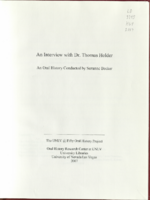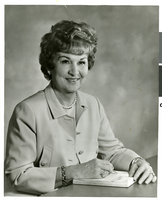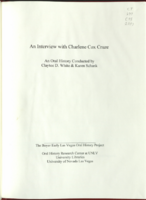Search the Special Collections and Archives Portal
Search Results
Jacque Olvera-Deki and Richard H. Deki oral history interview
Identifier
Abstract
Oral history interview with Jacque Olvera-Deki and Richard H. Deki conducted by Stefani Evans and Claytee D. White on March 18, 2024 for the Reflections: the Las Vegas Asian American and Pacific Islander Oral History Project. In this interview, Richard and Jacque describe their early lives, moving to Henderson, Nevada in 1997, and being in close proximity to both the 1 October and December 6 shootings in Las Vegas. Digital audio and photographs available; no transcript available.
Archival Collection

Michael Arage oral history interview: transcript
Date
Archival Collection
Description
Oral history interview with Michael Arage conducted by Dalton DuPré on November 12, 2021 for Reflections: The Las Vegas Asian American and Pacific Islander Oral History Project. In this interview, Michael Arage discusses his upbringing in the Greater Toronto Area (GTA), Ontario, Canada with his sister and his Filipino-Palestinian heritage. He talks about how his parents immigrated to the United States, his life and education in Toronto, and his relocation to Los Angeles, California where he married his wife. Michael Arage shares how the couple moved to Las Vegas, Nevada in 2012 when his wife started a job at Zappos. Because he lacked a work visa, Michael Arage began playing poker and working in sports betting. In 2019, he founded a community organization to support the people of Palestine, called Nevadans for Palestinian Human Rights. Michael Arage talks about his activism efforts, anti-Arab racism, his cultural upbringing, and of Filipino and Arabic foods and customs. He also shares his views of living in Las Vegas, the difficulties of raising a child away from her cousins, and differing governmental policies and healthcare between Canada and the United States.
Text
Michael Brown (Governor's Office of Economic Development) conducted by Kelliann Beavers: transcript
Date
Archival Collection
Description
From the Lincy Institute "Perspectives from the COVID-19 Pandemic" Oral History Project (MS-01178) -- Government agency interviews file.
Text

Transcript of interview with Dr. Thomas Holder by Suzanne Becker, August 08, 2006
Date
Archival Collection
Description
Text

Transcript of interview with Herb Jeffries by Cork Procter, May 5, 2009
Date
Archival Collection
Description
Text

Transcript of interview with Russell Terbeek by David Schwartz, May 29, 2015
Date
Archival Collection
Description
Text

Cindy Baca oral history interview: transcript
Date
Archival Collection
Description
Oral history interview with Cindy Baca conducted by Barbara Tabach on May 22, 2019 for the Remembering 1 October Oral History Project. Cindy Baca, born and raised in Las Vegas, talks about her family and occupation as a librarian at Escobedo Middle School. Cindy's twin daughters were present and injured during the Route 91 Festival and October 1 shooting. She describes their experiences and the Random Acts of Kindness project she piloted at her school after the incident.
Text

Photograph of a portrait of Judy Bayley, circa 1960s
Date
Archival Collection
Description
Image
University of Nevada, Las Vegas Office of the Vice President for Business Affairs Records
Identifier
Abstract
The records are comprised of budgetary and financial information dating from 1954 to 1988 created by the University of Nevada, Las Vegas (UNLV) Office of the Vice President for Business Affairs. The records include information about UNLV budgets, physical plant information, work programs, and correspondence sent to and from Herman Westfall, Vice President of Business Affairs from 1962 to 1987. The collection also includes Herman Westfall’s correspondence files which contain information such as estimative budgets, correspondence with UNLV presidents and colleges, contracts, memoranda, and committee information.
Archival Collection

Transcript of interview with Charlene Cox Cruze by Claytee D. White and Karen Schank, August 9, 2010
Date
Archival Collection
Description
Text
